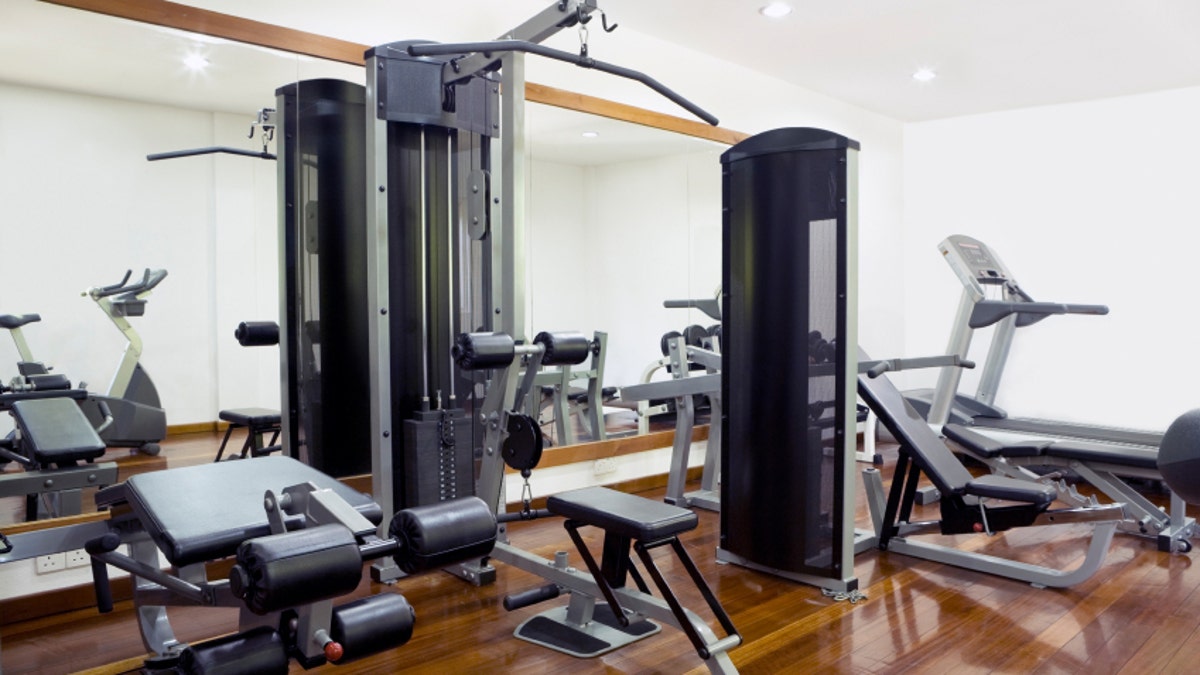
Interior of sport club with equipment
Strength training, it seems, is a subject similar to religion or politics: You need to be careful what you say and to whom you say it.
Gabriel Mirkin, MD, once wrote in The Runner magazine, "There is no proof that (lifting) will in any way improve your times." This caused a reader from New Jersey to reply: "Dr. Mirkin may be correct for runners blessed with a fair amount of upper-body strength," he wrote. "But I had very little strength to begin with and have found (after 6 months of Nautilus training) that I can now run any race without the extreme fatigue I formerly felt in my shoulders and arms."
More: How to Start Running
It's a good point, but it proves only that strength training benefited that particular runner. It may not benefit all of us, but we could all use a lesson refresher in weight room techniques.
Whether you're training for a race or just trying to improve your mile time, dipping into at least two days of strength training a week can help with all-around fitness. Here's what you need to know:
Running remains your best strength exercise
Exercise is very specific. To best develop your running muscles, you need to run—and run fast. Hill running is most favored by many runners interested in building strength. Weight lifting and other forms of strength training are important mainly as supplemental activities.
Don't compete with other lifters
The worst thing is to walk into a weight room and try to lift the same loads as weight-trained athletes around you. You wouldn't expect a 230-pound hunk to beat you in a 5K, so don't expect to outperform him in his sport.
Balance the benefits of free weights versus machines
Free weights do a better job of exercising the total body because they stress multiple muscles in a single lift. Machines, on the other hand, isolate muscle groups. If you choose to use free weights, be careful. Since they're not connected to a frame and pulleys, they can be dangerous if you're not accustomed to using them. Some lifts—such as squats and half squats—require proper lifting form to avoid injury risk, so seek out qualified instruction.
More: The Best Beginner Workout Gym Machines
The late Michael L. Pollock, PhD, who was director of the University of Florida's Center for Exercise Science, recommended exercise machines for masters because of safety. "As we age, we have balance problems," Dr. Pollock advised. "You're less likely to get hurt using a machine."
Avoid heavy weights
If you're interested in improving performance, as opposed to physique, stay away from lifting heavy weights. They may be hard on the lower joints, or they may cause you to bulk up. Excessive upper-body weight is dead weight in a 5K.
Watch your bathroom scale. If your weight-lifting routine causes you to gain bulk, try using less weight with more repetitions. I know from the times when I have posted this advice online that not everybody agrees with me. The flaming begins. Will heavy weights improve your strength and thus your speed? Possibly, but I worry about rookie runners and lifters injuring themselves. If you want to lift heavy, please find a strength coach to supervise your training.
Don't try to peak as a weight lifter
Some strength coaches advise you to fatigue each muscle to its maximum, increasing weights and varying reps as you improve in strength. This might be on-target for building muscles and bulk, but as a runner, that is not your goal. Over a period of time, develop a strength workout that you can do comfortably and consistently. Stay with it. Don't feel you need to do more.
Vary your lifting
The hard/easy principle works in lifting as well as in running. Lifters typically work one group of muscles one day, then rest those muscles the next day while they exercise a different group (yes, this is where "leg day" comes in!). If you're lifting on a daily basis, you may want to do the same.
Lift on your easy days
Coming in from a grinding interval workout and heading for the weight room is not a great idea. Save your lifting for those days when you run at an easier pace. Even after your easy run, rest a bit before hitting the weights. Exercise physiologist Dean Brittenham suggests doing your strength training at a different time of day from when you run. He feels that way, you'll get more out of each workout. True, but not all of us want to commit the time necessary for double workouts.
Lift most during the off-season
Not every runner has an off-season, but the best time of year for strength training is when you are not training hard or racing often. For those of us in the North, that's usually in the winter; for those in the hot and humid South, it may be summer.
Don't overlook the value of calisthenics
Situps, pushups, and pullups remain effective means of developing and maintaining strength. You don't need to buy a high-tech machine or join a glitzy health club. You can include calisthenics as part of your regular stretching routine.
Be your own person
Eventually, each runner should develop a strength routine specific to his own needs. "Whether or not strength training makes you a faster runner," says David L. Costill, PhD, "it makes you a fitter individual."
